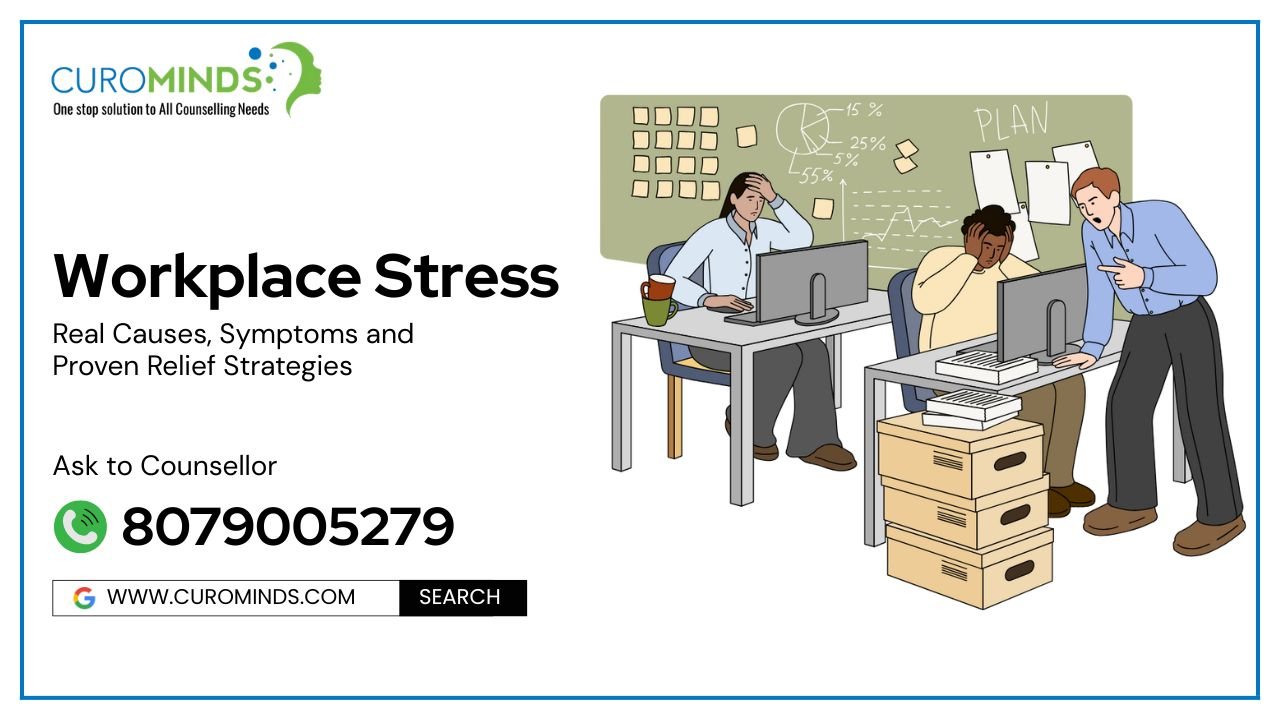Workplace Stress: Causes, Symptoms, and When to Seek Professional Help
Estimated reading time: 10 minutes
Workplace stress is the emotional or physical strain that comes from job-related pressure. It usually shows up when work demands feel greater than your capacity or control. A healthy amount of stress can motivate you, but chronic workplace stress affects sleep, mood, and even decision-making. The real signal to take it seriously is when it starts affecting your daily functioning, relationships, or health.
What Workplace Stress Really Looks Like
Work stress isn’t just about having a busy week. It’s when responsibilities, deadlines, or workplace dynamics start draining your energy instead of helping you grow.
In Indian workplaces, this often comes from unclear expectations, overwork, fear of job loss, long working hours, and toxic manager behavior.
Stress doesn’t arrive with a loud warning. It slowly becomes normal, until one day you realise you’re constantly tired or irritable, even on weekends.
Who Is Affected — and How Much
- Globally, about 15% of working-age adults have some form of mental health condition at a point in time — depression, anxiety or related conditions.
- According to WHO estimates, mental health and stress issues at work lead to 12 billion working days lost every year, costing the global economy roughly US$ 1 trillion annually.
- In India, a recent report from wellness platform YourDOST found that 64% of employees aged 21–30 report high stress levels.
- Another 2025 survey showed 41% of workers under 35 battling daily stress.
- Among Indian private-sector employees, around 42.5% report stress-related issues.
- A more general survey from 2023 revealed that 76% of Indian workers say stress is hurting their work performance; 49% said stress affects their mental well-being.
These numbers show workplace stress is neither rare nor restricted to a few sectors — it’s common across industries, ages and job types.
When these signs persist for weeks, it’s no longer just workload pressure. At this stage, professional stress counselling can help you understand triggers and develop coping skills.
Common Causes of Workplace Stress
These are the most reported causes of stress at work across Indian offices.
| Possible Cause | Real-World Example (India) | What Often Happens |
| Unreasonable deadlines | A designer asked to finish five banners overnight | Quality drops, late-night work becomes a pattern |
| Micromanagement | Manager constantly asking for updates | You feel judged, lose confidence |
| Lack of growth | Stuck in same role despite skills | Motivation drops, resentment builds |
| Job insecurity | Contract roles, layoffs | Anxiety even during normal tasks |
| Excessive workload | Small team, heavy targets | You skip breaks, sleep late |
| Poor work culture | Favouritism, politics | Stress becomes emotional, not task-related |
Signs the Cause Isn’t Just Workload
If stress continues even when your workday is light or you dread going to office despite liking your work, the cause is often relationship stress at work: team conflict, disrespect, or constant comparison.
Symptoms: How Workplace Stress Shows Up
Stress rarely begins as a breakdown. It first shows up as small changes you ignore. Let’s break it down into emotional and physical symptoms.
Emotional Signs of Job Stress
Emotional stress at work often shows up as irritability, loss of motivation, overthinking, or a sense of being trapped.
Possible signs:
- Easily irritated with colleagues or family
- Feeling guilty even when taking a break
- Overthinking emails or messages
- Constant worry about mistakes
- Feeling drained on Monday morning
- Losing interest in things you usually enjoy
Physical Symptoms of Work Stress
Physical symptoms of workplace stress include sleep disturbances, headaches, fatigue, and digestive issues caused by constant tension.
Common signs:
- Headache after working long hours
- Tight shoulders or neck pain
- Sleep issues or waking up tired
- Increased acidity or digestive trouble
- Rapid heartbeat before meetings
- Fatigue even after resting
Work stress affecting sleep is one of the earliest and most ignored signs. If you keep checking emails before bed or wake up with a racing mind, your body is signalling overload.
Stress doesn’t always show up the same way for everyone. Some experience emotional pressure, while others feel physical strain or exhaustion. To understand this better, it helps to look at the different types of stress people experience.
When Workplace Pressure Becomes Serious
Stress becomes a concern when:
- You can’t disconnect even after office hours
- Sleep problems last more than two weeks
- You cry, panic, or spiral mentally due to work
- Relationships at home start suffering
- You lose confidence in decisions you once made easily
Example: A content manager in Hyderabad began waking up at 4 AM, panicked about deadlines. She liked her job but the constant revision requests destroyed her confidence. She started avoiding calls and overthinking every message. The issue wasn’t skill; it was mental overload caused by unrealistic expectations.
What to Do When Office Stress Becomes Too Much
Here are practical strategies to reduce stress in the workplace without quitting instantly.
1) Set Boundaries Before Burnout
- Avoid checking work messages after a fixed time.
- Stop saying yes immediately; offer realistic timelines.
2) Protect Your Energy
- Don’t skip meals for meetings
- Take brief breaks every 90–120 minutes
3) Speak Up When Workload Is Unrealistic
Discuss solutions, not complaints:
- Ask for prioritization
- Request clarity instead of asking for less work
4) Use Focus Blocks
A simple routine:
- 50 minutes deep work
- 10 minutes break
This reduces mental fatigue and increases output.
5) Don’t Try to Impress Everyone
Work stress increases when you tie self-worth to praise. Deliver responsibility, not perfection.
Before thinking about quitting or blaming yourself, start with a few stress management techniques that protect your time, energy, and sleep.
When to See a Counsellor for Work Stress
You don’t need to hit rock bottom to talk to a professional. Seek help when:
- Stress impacts daily life or relationships
- You’ve tried coping but still feel overwhelmed
- Your confidence or self-esteem keeps dropping
- You’re constantly anxious before work-related interactions
Counselling helps you:
- Understand stress triggers clearly
- Build better boundaries
- Learn coping tools like CBT-based reframing
- Improve communication without fear
Reduce anxiety around workload and expectations
If stress is affecting sleep, confidence, or relationships, it’s worth learning how to seek mental health counselling, instead of enduring it alone.
How Counselling Helps with Workplace Stress
Counselling provides practical tools to manage workplace stress by helping you reframe thoughts, build boundaries, and deal with anxiety from deadlines, expectations, or workplace relationships.
Counsellors don’t simply give advice. They teach methods that make stress manageable, not bigger.
Many counsellors use CBT alongside boundary-setting tools that help reduce workplace anxiety. This kind of guidance is part of stress management counselling support, where you learn how to handle pressure without burnout.
Final Thoughts
Workplace stress is not a sign of weakness. It’s your mind and body asking for stability. If your stress begins affecting your mood, sleep, or relationships, take it seriously. Talking to a professional is not an overreaction. It’s self-respect.
Explore more articles that help students and professionals build a stable and healthy career path.
FAQs
Increased irritability, sleep issues, headaches, anxiety before meetings, and low motivation are common signs of workplace stress.
Practice boundaries, take short breaks, prioritize tasks, avoid late-night phone use, and try thought reframing to reduce negative thinking.
If stress affects sleep, confidence, relationships, or your ability to focus, talking to a counsellor can help you manage it better.
Yes. It can cause headaches, fatigue, digestive issues, and sleep disturbances due to prolonged tension and anxiety.
Counselling helps you recognize triggers, build boundaries, and use tools like CBT to manage negative thoughts, fear, or pressure.













